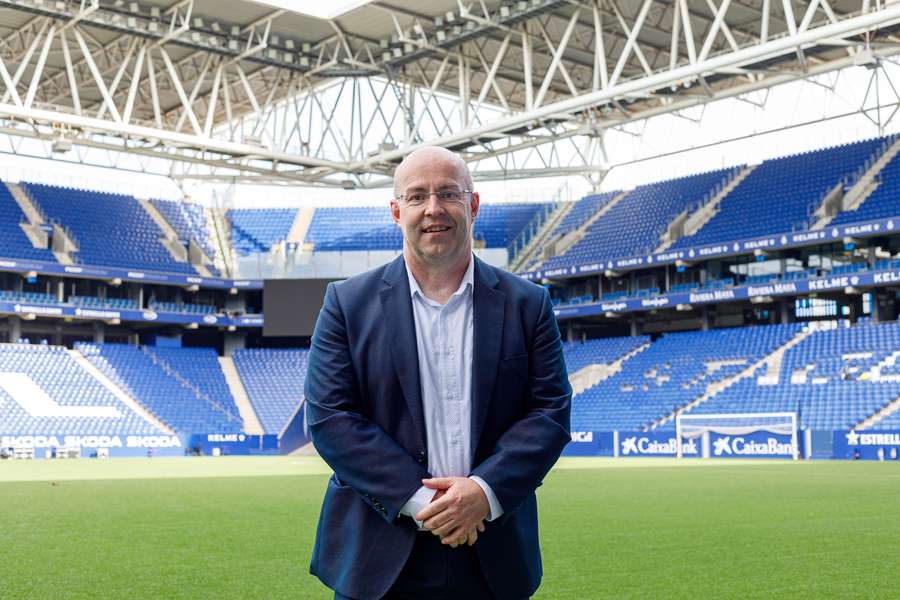Leo discusses his work with major football associations, highlights the top social media profiles of Euro 2024 stars, and delves into the potential dangers of the digital world for the younger generation of footballers. The 53-year-old expert provides a detailed look at how social media influences the sport, offering a unique perspective just weeks before the tournament kicks off.
Mario, Euro 2024 is just around the corner. As a German, you must have been looking forward to this major event in your country for some time now. Despite all the professionalism required as a data expert, how much anticipation and emotion are you already feeling?
"I'm looking forward to it. Being the organiser, having such a big tournament in your own country, is something special. Germany is very good at organising major events. It will be a great event with full arenas and great sports. Honestly, some days I already have goosebumps when I think about the opening game. Great anticipation."
With UEFA, the DFB and the Austrian Football Association, you supply three organisations involved in the EURO. What requests do they come to you and your team with before, during, and after this major event?
"We are very involved in planning issues before the tournament. What content, and formats are currently working on social media? What does the target group want? We also support match day processes at UEFA and the DFB.
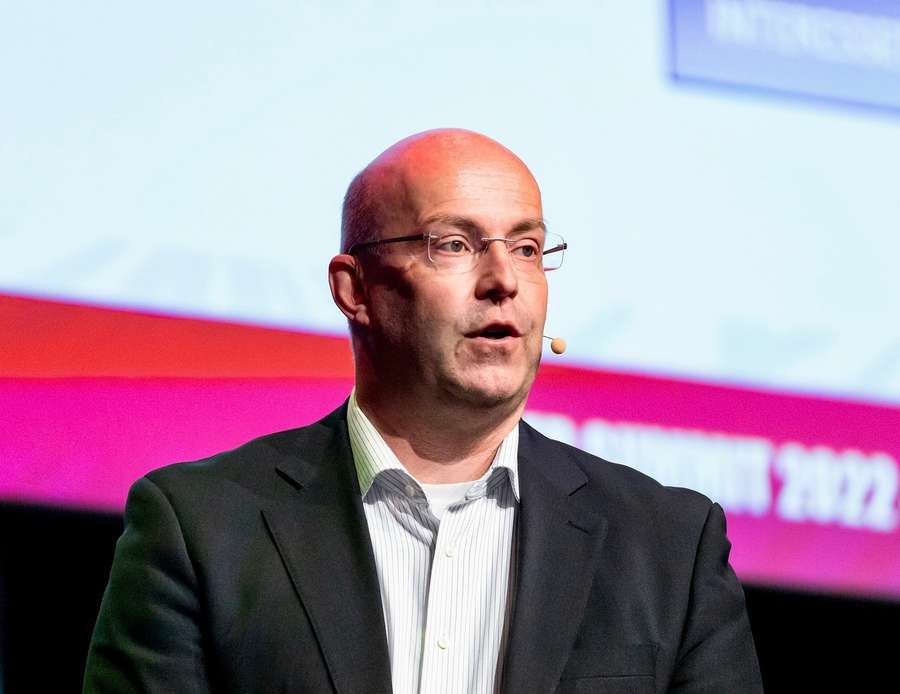
"For example, we screen racist posts on Facebook and Instagram so that we can act and react safely and purposefully in crisis communication. We then analyse the situation afterwards. For example, what impact did Austria's surprising victory against France have?
"The associations want to evaluate marketing and sponsorship values to learn for the next matches and tournaments and to be able to make any necessary adjustments to their own media performance."
Let's dive deeper into the data. Which European national football associations are the leaders according to your analyses?
"You have to make a distinction. On the one hand, there are the big nations that have large numbers of followers, such as England, France, Germany and Spain, but also Portugal with Cristiano Ronaldo. On the other hand, there are emotionally inspiring associations such as Poland and Scotland, which have incredibly high interaction rates.
"Reaction and interaction are becoming increasingly important, which is why these associations must also be praised and counted among the absolute best. In general, football is a social media pioneer, and this extends to small nations such as Gibraltar and San Marino."
You mentioned smaller associations that are successful on social media and generate great figures. What exactly is their recipe for success so that they don't get lost alongside the social media profiles of the big associations?
"It's primarily down to society's interest in football. In countries like Poland and Romania, national pride is very pronounced, in other nations less so. However, football is also the most popular sport in the world and therefore always makes big waves in the digital world. Social media is a great sensitiser that multiplies various streams of opinion. Particularly in conjunction with major events, social platforms are a channel for communicating joy, but also for venting frustration.
"A late goal conceded in injury time can ruin a potential win in sports betting. This frustration is then vented towards the association and the players. Here it is important to take the right steps in communication so that the frustration does not take centre stage.
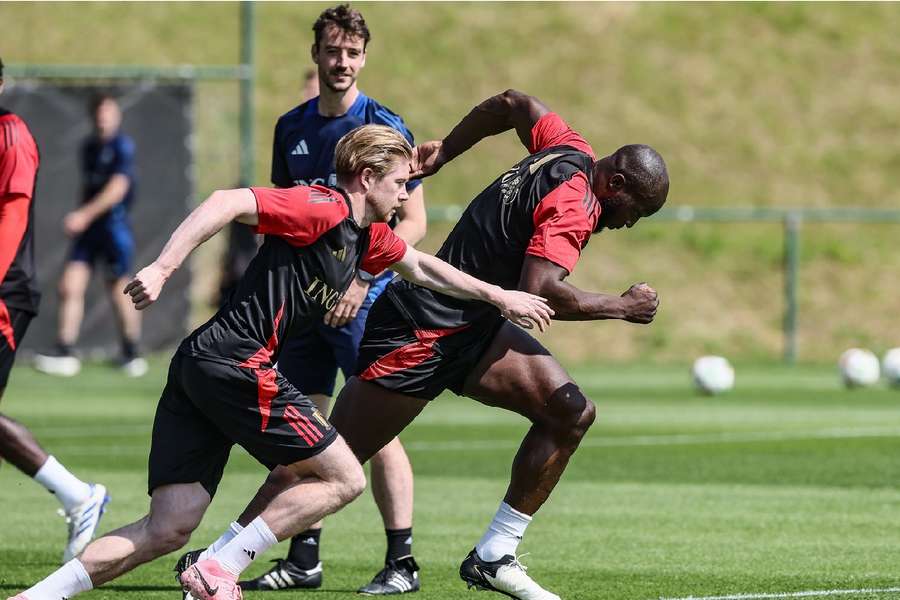
"But to come back to the question: Smaller associations have a good chance of standing out, especially if they are creative and authentic. Insights into the team camp, perhaps also a little into the players' private lives. And to a certain extent, it's also down to the role models.
"Belgium has managed to develop globally recognised footballers - Thibaut Courtois, Kevin De Bruyne, Romelu Lukaku. If these players are closely involved in the association's communication, everyone involved - players, association, fans and sponsors - can benefit enormously. In Belgium, something else is also remarkable."
What is it?
"The Flemish and Walloons disagree on many issues, but when it comes to football - when it comes to supporting their national team - they are united. This is quite unique in Europe, but it's nice to see the impact that football can have when paired with good communication."
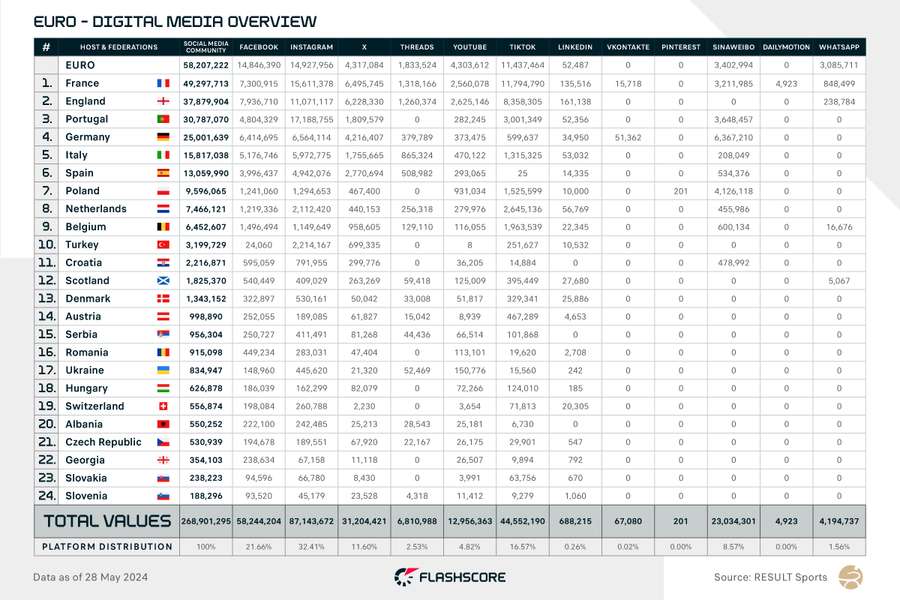
Result Sports has already produced extensive data analyses for past major football events. Did you also include the impact of sporting success in your analyses back then? If so, what insights are there into the interplay between sporting and digital success?
"Yes, we observed this issue as recently as January at the Africa Cup. There are always surprise effects that are characterised by special results and events. Social media can certainly be planned, but these short-term effects - European and World Cups are perfect examples here - happen regularly.
"When the Austrian striker Michael Gregoritsch scores a hat-trick in the first group match against France, tens of millions of users search for his social media profile. A large proportion of these people will then remain as followers. With a bit of luck, he will also be listed on Google Trends for a few days.
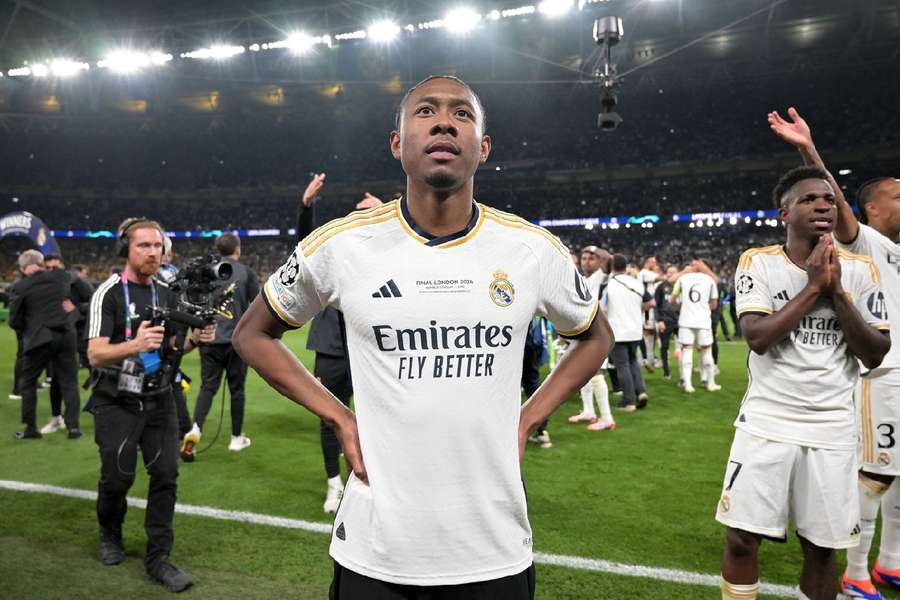
"Another example is transfers: David Alaba had around two million followers on Instagram shortly before his transfer from Bayern Munich to Real Madrid. A few days after the transfer, he had six million. Today, around three years after this change of club, 15 million people follow him. This also shows the immense importance of Real Madrid compared to other top clubs. Real is playing in a completely different league here."
Speaking of Real Madrid: You advised Juventus on the transfer of Cristiano Ronaldo from Real Madrid to the Old Lady in terms of digital potential. You documented this experience in your 2020 book "Buy Ronaldo". CR7 is probably playing his last major tournament for Portugal. But is he still number one on social media?
"Yes, he's by far the number one. He's the first sportsman to share his life with more than 900 million people on his profiles. Kylian Mbappe is in second place among all players taking part in the EURO. With 80 million followers, Toni Kroos is already a respectable distance behind.
"It is also interesting that with Ronaldo, Kroos, Luka Modric, Robert Lewandowski, Marco Reus, Thomas Müller and Pepe, seven players over the age of 30 are represented in the top 10. Once again, it's all about role models and success stories that people are looking for on social media."
Which players do you think will make a breakthrough at EURO 2024, both in sporting and digital terms? Who do you think has particularly high potential to increase their follower and interaction numbers?
"Phil Foden, who was voted the best player in the Premier League just a few days ago and will be an important part of the Three Lions at Euro 2024, could cause a sensation - both on the pitch and on social media. He is currently in 20th place in the social media ranking of EURO participants. There's still room for improvement and I'm pretty sure we'll see a great development of his channels. As an England international, he can also benefit enormously from the media appeal of the Three Lions.
"On a slightly smaller scale, Germany's Aleksandar Pavlovic also has huge potential to give his name and brand a boost on social media. The same applies to the Serbian Lazar Samardzic. The important thing is that the player can make a difference. A player who fits in well with the collective is unlikely to go through the roof on social media. As a difference-maker, the potential for a strong media presence is much greater."
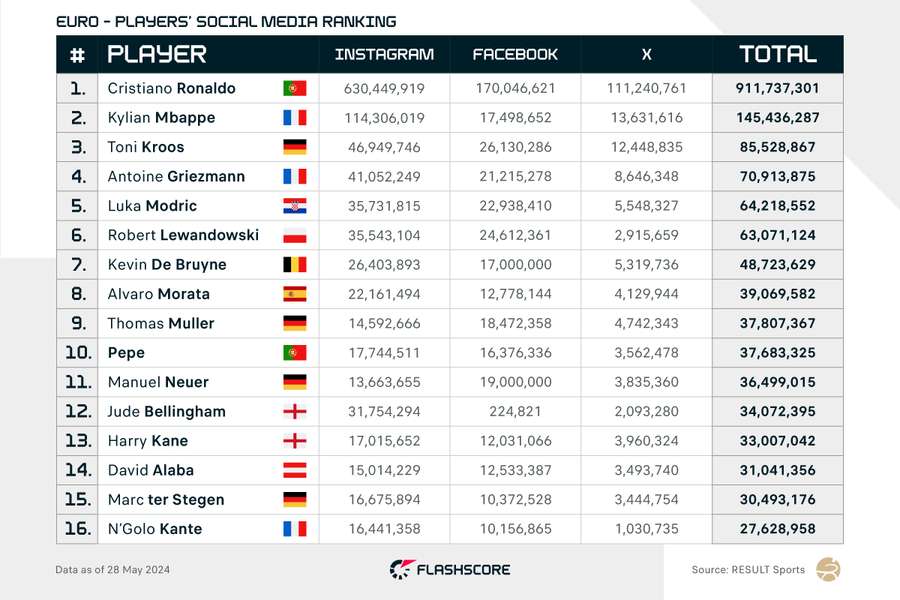
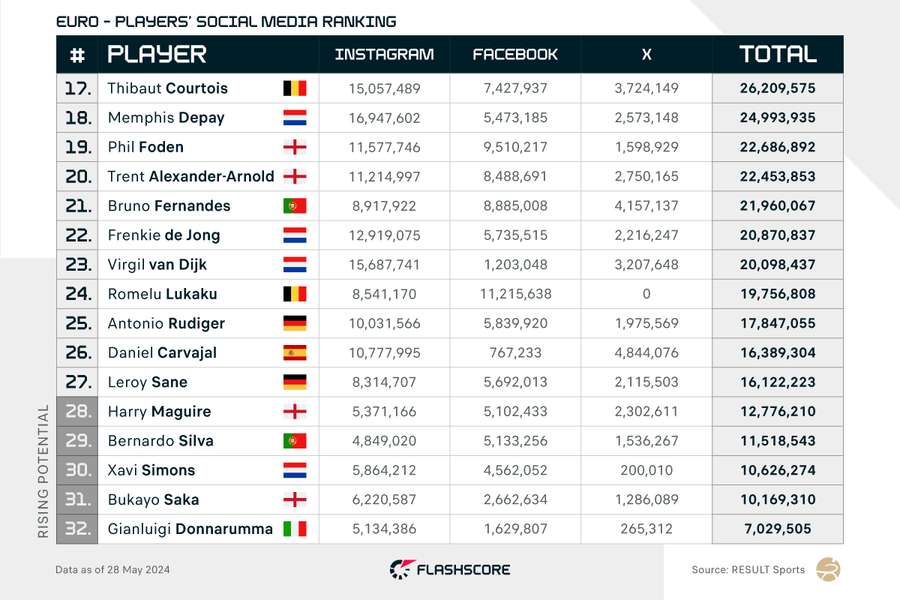
The psychological impact of social media on young people who are not yet fully familiar with social media has also been a hot topic in recent years. The new generation of footballers in particular is often accused of immediately looking at their smartphones in the dressing room after matches. How do you categorise this development?
"I wouldn't generalise here. Even though many players have their smartphones in their hands in the dressing room, it doesn't mean that everyone is on social media. Private messages and congratulations are often answered. But I see a different problem."
Which one?
Social media is great when you're successful. You get lots of congratulations, everything is wonderful. However, far too few players give serious thought to how they can use social media if they are not successful. This topic needs to be approached in a very sensitised way. Not just with professionals, but much earlier in the academies and youth teams.
"Athletes are given the prospect of building their brand while they are still young, but only very few make it to the professional ranks. As a result, expectations are built up over many years that most players will not fulfil. The drop is brutally high. Media training and brand building must be pursued with great caution, but consistently and sustainably, to give players the tools they need to survive in the media, even in poorer phases."
Are there footballers who consciously try to counteract these potential dangers and challenges? If so, how can this be achieved?
"It's not about banning social media. Rather, it's about prioritising the team community around the game. Why shouldn't it be possible for the captain to collect all smartphones five hours before and after the game? No distractions, full concentration on the game.
"Studies have shown that distractions and the associated dopamine surges can influence the error rate during a match. I can only repeat myself: awareness is extremely important."
Let's take a look into the future: Which social media platform will dominate the next 5 years?
"I think that the currently popular platforms will continue to dominate in the next three to five years. Especially those that attract large communities. However, we have also seen in the past with examples such as Google+ that individual platforms disappear again. But they mainly disappear because of the business model.
"That's why I believe that Meta, for example, will be present as an online platform in the coming years. Around four billion followers, spread across all Meta platforms, are such a strong community that they are de facto impossible to displace from the market. In short: Meta will remain the top player with Facebook, Instagram, Threads etc.
"We'll have to wait and see with TikTok. The last four or five years have been very strong, but growth is currently stagnating. In addition, starting in the USA, TikTok is now also being scrutinised very critically in Europe. There are already major studies investigating the risk of addiction posed by social media platforms, especially TikTok. I can imagine that the EU will issue a regulation that limits the consumption of TikTok, as well as other social media platforms, to a certain number of hours per day. This needs to be monitored closely to assess the potential of TikTok more accurately.
"The third player is Google, which probably has the most diverse portfolio with YouTube and search. Amazon with Twitch and Microsoft with LinkedIn and Skype will try to break through the phalanx of the big three. From today's perspective, however, there is still a long way to go."

